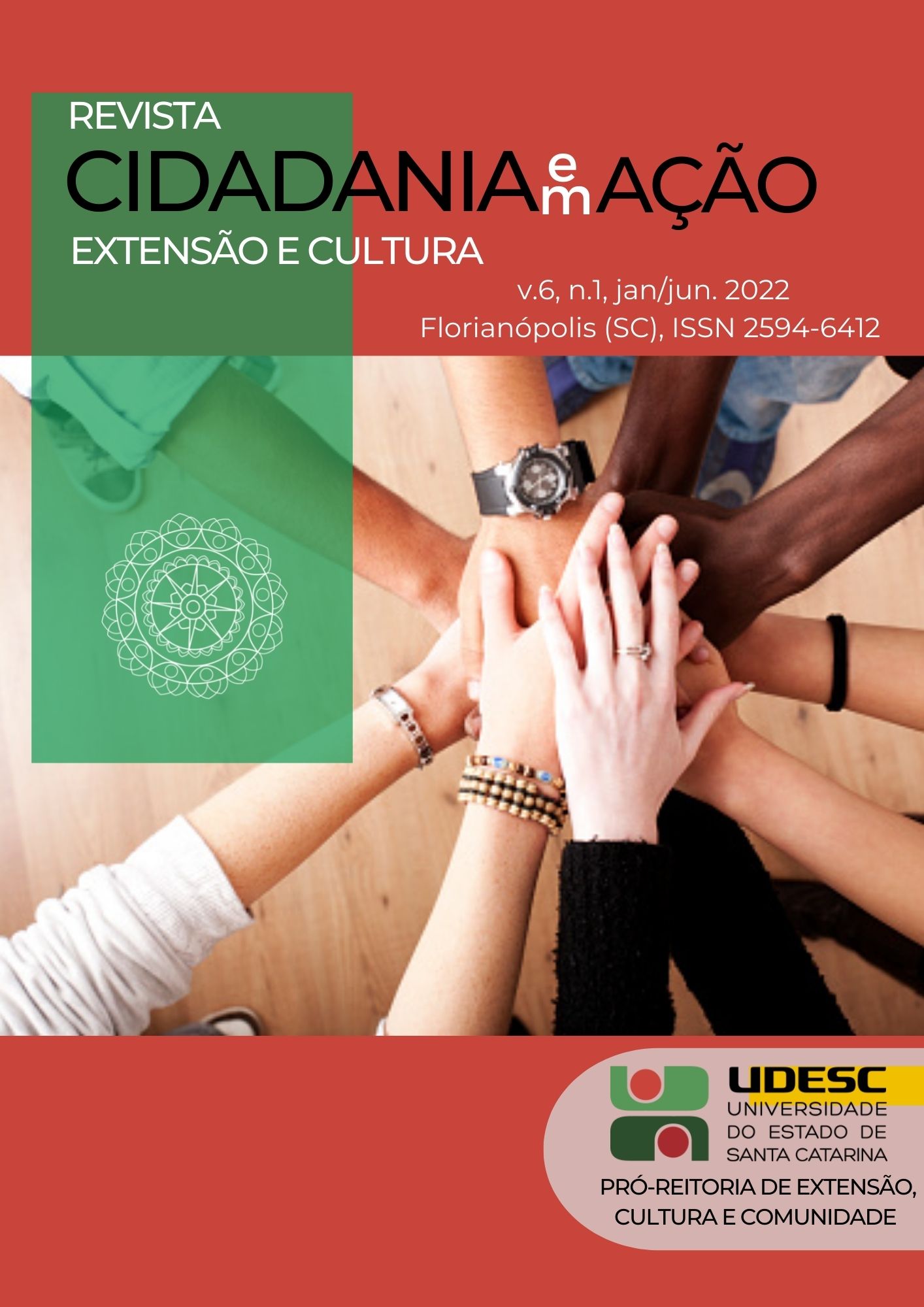Educação Física para pessoas em situação de rua: uma reflexão da capoeira a partir do fato social
DOI:
https://doi.org/10.5965/cidea.v6i1.22157Palavras-chave:
Educação Física, Capoeira, Pessoas em situação de rua, Fato socialResumo
As imposições expressas por uma determinada sociedade, refletida em forma de agir, pensar e sentir, as quais apresentam-se marcadamente como fatores exteriores ao indivíduo podem exercer um poder imperativo e coercitivo da sociedade sobre eles. Tal perspectiva tem sido observada em pessoas em situação de rua (PSR). Esta pesquisa tem como objetivo uma análise reflexiva da Educação Física, em sua perspectiva pedagógica e sociocultural do corpo em movimento, tendo como base entendimento da PSR a luz do “fato social”. Os estudos que nortearam a pesquisa se fundamentaram em: evidências históricas e socioculturais do corpo na sociedade; aspectos pedagógicos da educação física; e as relações sociais construídas pelas PSR. O estudo utilizou-se de observação direta e elaboração de roteiros. Foram realizadas coleta de dados exploratória, por meio de leituras e análise do contexto social em que seriam realizadas as atividades e observações em contexto prático. A atividade proposta foi a Capoeira, por ser uma manifestação cultural que se aproximou mais das relações históricas e culturais de construção da identidade brasileira. A ação pedagógica atribuída se baseou nos componentes procedimentais, conceituais e atitudinais. Apesar de um repertório motor variado, a luz do “fato social”, foi observado que as PSR não são sequer percebidas pela sociedade. Destaca-se neste contexto, uma ruptura de identidade cultural associada à autoimagem, autoestima abalada e dificuldade de autoafirmação. Isso se reflete como ponto central para a integração social da PSR. Foi observado uma necessidade de um debate mais amplo sobre as possibilidades de estimular um espaço para “escuta” durante as aulas; inserir de forma indireta aspectos atitudinais e conceituais por meio das expressões corporais e músicas como uma forma de trabalhar autoimagem das PSR estudadas.
Downloads
Referências
AZEVEDO, Juliana Almeida; TAVARES, Otávio; SOARES, Antonio Jorge G. Discursos identitários da capoeira na Revista Brasileira de Ciências do Esporte (RBCE). Rev. Bras. Cienc. Esporte, Campinas, v. 30, n. 1, p. 171-185, set. 2008.
BERGER, Peter L. Perspectivas sociológicas: uma visão humanista. Tradução de Donaldson M. Graschagem. Petrópolis: Vozes, 1986.
CASTELLANI FILHO, Lino. Educação Física no Brasil: a história que não se conta. Campinas, SP: Papirus, 1998.
DARIDO, Suraya Cristina; RANGEL Irene Conceição Andrade. Educação física na escola: implicações para a prática pedagógica. Ed. Guanabara Koogan, 2005.
FIALHO, Paula Juliana Foltran. MULHERES INCORRIGÍVEIS: capoeiragem, desordem e valentia nas ladeiras da Bahia (1900-1920). Tese de doutorado- PPGHIS- Universidade de Brasília - Brasília, 2019.
GERHARDT, Tatiana Engel; SILVEIRA, Denise Tolfo. Métodos de pesquisa Universidade Aberta do Brasil – UAB/UFRGS. Curso de Graduação Tecnológica – Planejamento e Gestão para o Desenvolvimento Rural da SEAD/UFRGS. – Porto Alegre: Editora da UFRGS, 2009.
GOMES, Christianne Luce. Lazer: necessidade humana e dimensão da cultura. Revista Brasileira de Estudos do Lazer, v. 1, n. 1, p. 3-20, 2014.
IPHAN – Dossiê: Inventário para registro e salvaguarda da Capoeira como patrimônio cultural do Brasil, Brasília - 2007.
IPHAN, Salvaguarda da Roda de Capoeira e do Ofício dos Mestres de Capoeira: apoio e fomento / coordenação e organização Rívia Ryker Bandeira de Alencar. – Brasília 2017: IPHAN (Patrimônio Cultural Imaterial: para saber mais, 3) 36 p. ISBN: 978-85-7334-314-4.
LUSSAC, Ricardo Martins Porto e TUBINO, Manoel José Gomes. Capoeira: a história e trajetória de um patrimônio cultural do Brasil. Rev. da Educação Física/UEM- Maringá, v. 20, n. 1, p. 7-16, 2009.
RODRIGUES; José Albertino. Émile Durkheim: sociologia. 3 ed. São Paulo: Ática, 1984.
SOARES, Carmem Lúcia. Imagens da educação no corpo: estudo a partir da ginástica francesa no século XIX. ed. Campinas, SP: Autores associados, 2005.
VIDOR, Elisabeth; REIS, Letícia Vidor de Souza. Capoeira: uma herança afro-brasileira. 1 ed. São Paulo: Selo Negro, 2013.
Downloads
Publicado
Como Citar
Edição
Seção
Categorias
Licença
Copyright (c) 2022 Cidadania em Ação: Revista de Extensão e Cultura

Este trabalho está licenciado sob uma licença Creative Commons Attribution 4.0 International License.









